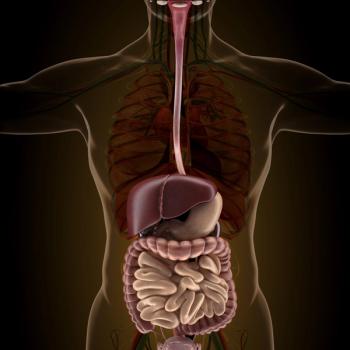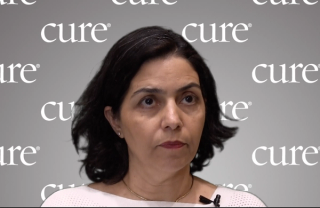
Gastrointestinal Cancers
Latest News
Latest Videos

More News

Palliative care for young adults with colorectal cancer reduced invasive procedures, costs and increased DNR orders.

In resectable, locally advanced esophageal squamous cell carcinoma, neoadjuvant Tyvyt plus chemoradiotherapy led to an improvement in response rates.

Frontline treatment with Tevimbra plus irinotecan, paclitaxel, oxaliplatin and 5-FU/leucovorin had promising efficacy and manageable safety in gastric/GEJ cancer.

Dr. Filippo Pietrantonio discusses OrigAMI-1 trial data which assessed Rybrevant in mutated, wild-type, non-HER2-amplified metastatic colorectal cancer.

Dr. Jonathan R. Strosberg, discussed results of the CABINET trial evaluating Cabometyx versus placebo in advanced gastrointestinal NETs.

Topline results from the COMPETE trial showed that ITM-11 met the study’s primary end point of PFS in inoperable, progressive grade 1 or grade 2 GEP-NETs.

In the LEAP-015 trial, Keytruda and Lenvima plus chemo did not meet the primary end point of overall survival in HER2– gastroesophageal adenocarcinoma.

In the INNOVATION trial, adding Herceptin and Perjeta to chemotherapy increased toxicity in patients with HER2-positive gastric cancers.

The combination of Opdivo and Yervoy is supported by updated results as a standard of care for MSI-H or dMMR metastatic colorectal cancer.

Despite the initial shock and challenges, I found strength and support within the community of single parents.

Among those with advanced gastric cancer, oral Liporaxel showed superior overall survival outcomes versus IV Liporaxel as a second-line therapy.

Synchronous metastases did not affect survival in resected BRAF V600E-mutated metastatic colorectal cancer.

Dr. Scott Kopetz discusses the BREAKWATER trial investigating Braftovi and Erbitux plus chemo in those with BRAF V600E+ metastatic colorectal cancer.

Neoadjuvant Keytruda for patients with deficient DNA mismatch repair colon cancer resulted in a pathological complete response rate of 44%.

Among patients with resected gallbladder cancer, the addition of chemoradiation to chemotherapy treatment did not improve relapse-free survival.

A study showed Cabometyx improved time before disease progression in advanced digestive NETs compared with placebo.

Treatment with bezuclastinib plus Sutent led to safe and efficacious outcomes versus Sutent treatment alone in gastrointestinal stromal tumors.

Adults with primary primary appendiceal adenocarcinoma face a higher risk of developing a second primary cancer, including colorectal and prostate cancers.

Opdivo plus chemo showed long-term survival advantages in Chinese patients with advanced gastric, gastroesophageal junction or esophageal cancer.

Among patients with advanced gastric and GEJ cancer, or esophageal adenocarcinoma, treatment with first-line Opdivo and chemo demonstrated deep responses.

SHR-1701 plus chemo suppressed chemo-associated myelosuppression in patients with HER2-negative gastric or gastroesophageal junction adenocarcinoma.

Afinitor plus Somatuline showed an improved survival compared with Afinitor monotherapy in patients with gastroenteropancreatic neuroendocrine tumors.

Dr. Balazs Halmos discusses the significance of the approval of subcutaneous Opdivo and what this treatment formulation means for those with solid tumors.

From the death of a TikTok influencer to an update from a “Boy Meets World” star, here is this week’s news.

For patients with gastrointestinal stromal tumors with liver metastases, treatment with surgery and chemotherapy has been found to have survival benefits.













